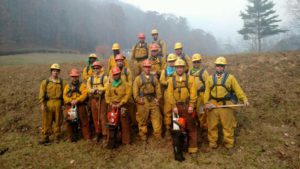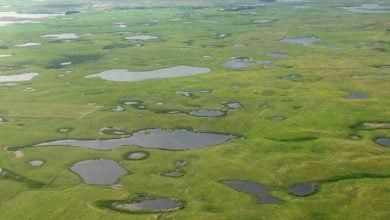 In western North Carolina as well as seven other Southern states, wildfires continue to dot the landscape with destructive voracity. These wildfires, many linked to arson, have spread so wantonly and rapidly due to a number of factors associated with the current drought conditions in the south-eastern part of the United States.
In western North Carolina as well as seven other Southern states, wildfires continue to dot the landscape with destructive voracity. These wildfires, many linked to arson, have spread so wantonly and rapidly due to a number of factors associated with the current drought conditions in the south-eastern part of the United States.
Environmental change caused by capitalism has resulted in low humidity and rainfall in the region. A cycle of climate change has evolved where one drought leads to more droughts, sometimes increasing in severity, sometimes not.
The Southern Coordination Center’s Adam Rondeau claimed: “The lower humidity and significant lack of precipitation for more than three months have made a perfect environment for fires to spread,” adding: “It makes them faster and stronger.”

Incarcerated people sent to fight fires
Without preventative measures and foresight regarding the potential severity of the forest fires in the region, firefighting crews have been flown in from all points around the country–including superexploited incarcerated workers who have been trained as firefighters.
The NC BRIDGE, the prison firefighting program, reports that incarcerated firefighters are working an average of 14 hour days fighting the fires and often times pulling 24 hour shifts, according the program’s Facebook page. Pictures show prisoners working often times without masks as they fight to push back the growing forest fires.
Inmates from five Georgia prisons were dispatched to clear combustible materials around evacuated homes where the Rough Ridge fire is being fought.
People have to evacuate themselves
Across the western half of North Carolina, six counties have been evacuated in response to the continued blazes, which has been active in certain areas since October. Other areas affected facing issues with air quality.
In Macon County, the risk of respiratory complications became so severe that N95-rated masks were distributed, as standard surgical masks typically used are unable to prevent the inhalation of the smoke particles.
Under capitalism, these disasters leave families and individuals on their own as towns like Lake Lure and Highlands Meadows Acres community in Western, NC, were forced to evacuate as the Party Rock Fire headed toward them.
“They just told us to get out,” said Neil Worden, who evacuated from Highlands Meadows to with his dogs and personal items to go stay with friends.
As all this transpires, Governor Pat McCrory has called for retribution to be wrought upon those responsible for setting any of the fires, offering a $10,000 reward for anyone able to shed light upon the identity of the arsonists.
Of course, it is difficult to take seriously the concern shown by McCrory for the residents of North Carolina, given that as these fires burn and people’s livelihood’s turn to ash, he continues to waste state resources contesting the election that should have removed him from office.
North Carolina has no funds immediately available to aid prevention, preparedness, and emergency response to natural disasters such as these flames flickering across the western portion of the state.
Indeed, putting aside the rhetoric of budget slashing and austerity put forward by both Democrats and Republicans, the reality is that in the past 30 years the state budget has remained relatively static. Accounting for inflation the state budget in 1989 was just over $21 billion, which if spread equally across the then population of about 6.5 million would amount to about $3,076 per resident. The 2016 budget came out to about $22.3 billion. With an additional 3.5 million residents since the last year of the 1980s, this would amount to about $2,230 per North Carolinian.
With continued tax cuts for the wealthiest in the state along with tax breaks for corporations, this kind of breakdown is not as far from reality. It has become working people’s burden to finance the state.
The reserve fund, of course will not be there when it comes time to help communities rebuild fires have ceased to burn and smolder, just as it was not there for working class families who in some cases lost their homes and in others lost income from the damage done to their place of employment.
Only a state where the services first cut are those that affect the already most vulnerable, would allow these funds to sit idle while families live with the devastation of these natural disasters.
This lopsided approach to disaster can be turned around in a planned economy under socialism, eliminating factors that cause droughts, floods and other changes in climate that lets the drive for profits reign endangering the environment.
In a socialist society, not only would prevention and planning for natural disasters take place averting many fires, communities would have the resources to support those most affected as they tried to rebuild.






